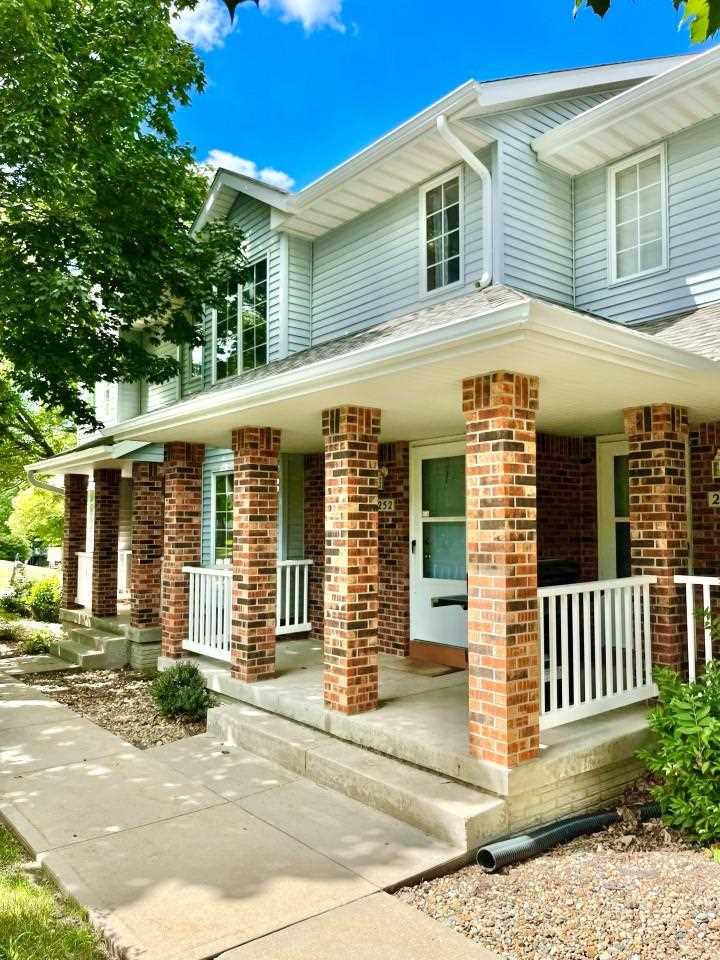Why does a stranger need to walk through the house I’m about to buy?
It’s a common question we hear from first-time buyers in the Iowa City-Cedar Rapids area. The entire appraisal process can feel like it’s shrink-wrapped in mystery and paperwork… lots of paperwork.
This stranger will spend less than an hour in your future home, but their professional opinion could impact your purchase in a major way. Buyers wonder when this happens in the home-buying timeline and what to expect.
We’re removing the shrink wrap, covering everything you need to know about appraisal timing and the process itself, so you can approach your home appraisal with confidence on closing day.
What is a Home Appraisal?
A home appraisal is an unbiased professional assessment of a property’s market value. It’s an expert’s educated opinion on what your potential new home is actually worth in today’s market.
Lenders require appraisals to protect their investments. When they loan you money to buy a home, they want to make sure the property is worth at least as much as you’re paying for it. This protects both you and the lender from overpaying.

Lenders, not buyers or sellers, order the appraisal to keep the process independent and objective. An appraiser will visit the property, examine its condition, research recent sales of similar homes in the area, and determine a fair market value.
Appraisals are crucial during busy markets when homes sell fast and prices go up. They help contain the excitement of making an offer, so bidding wars don’t lead to unrealistic property values.
What’s the Appraisal to Closing Timeline?
The appraisal typically happens 7-10 days after your lender approves your loan application.
Once your lender reviews your financial documents and gives initial approval for your mortgage, they’ll order the appraisal. The appraiser then schedules a visit to the property, which usually occurs 1-3 weeks before your scheduled closing date.
Certain factors can shift this timeline:
- Loan type: Conventional loans often move fastest, while government-backed loans, like FHA or VA loans, may take more time for specialized appraisers familiar with these program requirements.
- Appraiser availability: In the Iowa City-Cedar Rapids Corridor, we typically have good appraiser availability, but the busy spring and summer seasons might extend scheduling by a few days.
- Property complexity: While a straightforward single-family home usually gets scheduled quickly, unique properties or those needing specialized knowledge may take longer.
- Market conditions: During peak buying seasons, appraisers stay busier, which can push out timelines.
Most buyers should expect the appraisal inspection to occur roughly two weeks after loan approval, with the completed report following within a week of the visit.
The Step-by-Step Appraisal Process
Now that you know when the appraisal is done, let’s go over what you can expect next.
Step 1: Lender orders the appraisal
After reviewing your loan application and financial documents, your lender contacts a licensed appraiser or appraisal management company. They provide basic property information and specify any special requirements for your loan.
Step 2: Appraiser schedules the property visit
The appraiser contacts the listing agent (or homeowner if it’s a for-sale-by-owner property) to schedule access. Most appraisers can accommodate schedules within a few days of the initial call.
Step 3: Physical property inspection
The appraiser visits the property for a thorough examination. This generally takes 30-60 minutes, depending on the home’s size and complexity.
Step 4: Research and analysis
After the site visit, the appraiser researches recent sales of comparable properties, analyzes market trends, and considers unique features that might affect the value.
Step 5: Report completion
The appraiser puts their findings into a detailed report, which they usually complete within 3-7 days of the property inspection.
Step 6: Report delivery
The finished appraisal goes to your lender, who reviews it and shares the results with you and your agent.
What Happens During the Home Appraisal Visit?
The appraiser works alone or with the listing agent present. As a buyer, you typically won’t attend this appointment, though some appraisers welcome questions if you’re available.
During the visit, the appraiser measures rooms to verify square footage, examines the condition of the home, and documents features that could impact the value. They’ll note things like updated kitchens, finished basements, recent roof replacements, or any maintenance issues that might change the property’s worth.

The appraiser also takes pictures of the exterior and interior for their report. They look at the home itself and how it compares to other properties in the neighborhood.
If you’re living in the home you’re selling, don’t worry about making everything perfect. Appraisers understand that people live in their homes. Just make sure the appraiser can access all areas, including basements, attics, and any outbuildings included in the valuation.
After the Appraisal: What Comes Next?
One of these two scenarios unfolds after the appraisal report reaches your lender:
Scenario 1: The appraisal meets or exceeds your contract price
If this happens, everything moves forward smoothly. This is common in most transactions, especially when your REALTOR® has helped you make a competitive but realistic offer.
Scenario 2: The appraisal comes in below your contract price
Let’s say the seller is asking $375K for the home you want to buy, and you’ve offered them asking price. But then the appraiser values the home at $350K—$25K shy of your offer.
You have several options in this scenario:
- Negotiate with the seller for a lower price
- Bring extra cash to closing to cover the $25K difference
- Walk away from the deal if your contract includes an appraisal contingency
Low appraisals aren’t always deal-killers. We’ve helped many clients navigate these situations with a little negotiation and creative problem-solving.
From appraisal completion to closing, you’re typically looking at 1-2 weeks, assuming no major issues come up.
Your lender then needs time to finish underwriting and prepare the final loan documents.
How Much Does a Home Appraisal Cost in Iowa?
In Iowa, home appraisals cost around $650. That number fluctuates depending on your property and loan type.
For example, the home appraisal cost for a multifamily home is often higher. Rural properties of those with limited comparable sales in the area may also cost more since they need extra research.

Who Pays for the Home Appraisal?
The buyer handles the appraisal cost, which is often included in your closing costs. Some buyers negotiate for sellers to cover this expense as part of seller concessions, but the standard expectation is that buyers pay.
The costs of buying a home add up fast. But rest assured that this one-time cost protects you from overpaying for your new home and gives your lender confidence in the property’s value.
Tips for a Smooth Appraisal Process
Good news: We’ve found that most appraisals align well with market values when buyers work with experienced agents who understand local pricing trends.
Here are some tips to ensure your home appraisal goes off without a hitch:
For Sellers
Keep your home accessible for the appraiser’s visit and make sure you turn on all utilities. This helps appraisers verify that systems work properly.

If you’ve made recent improvements, provide documentation or receipts that help prove added value. Many homeowners create a home improvement packet, which includes dates, costs, permits, and detailed information on less-obvious features (like smart home systems or energy-efficient windows).
For Buyers
Patience is your best tool during an appraisal. Know that slight delays are normal and don’t always signal problems. Trust your agent to communicate with all parties and keep you informed about updates.
Once the appraisal is complete, review it carefully with your agent. You want to look for any potential errors, including incorrect square footage or lot size. Be prepared for a low appraisal and have a game plan for negotiating with the seller.

It’s just as important to know when to walk away—if the seller is unwilling to negotiate and you’re unable or unwilling to pay the difference, this is an option. You’ll likely still have to pay the appraisal fee, but it’s better to walk away than overpay and be underwater on your mortgage.
Tackle the Home Appraisal with an Experienced REALTOR®
The home appraisal might feel like an extra hoop to jump through, especially when you’ve been dreaming of getting the keys to your new place. But it’s an essential milestone when you’re buying a home.
At Urban Acres, we’ve guided clients through countless appraisals, from straightforward valuations to more complex situations requiring negotiation. We know the local market nuances that can affect appraisal outcomes in the Iowa City-Cedar Rapids area.
If you’re looking for a real estate team to help you navigate every step of the home-buying experience, contact us today.





